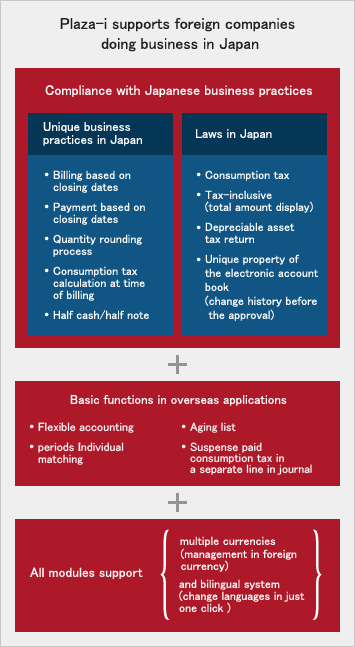Foreign Affiliated Companies
Plaza-i, which is developed in Japan but includes necessary functions for foreign affiliated company, is the best solution for you.
Plaza-i supports not only basic functions which foreign-made software typically include, but also is compliant with Japanese business practices.
Your merchandises may be imported from your parent company, but your customers are Japanese and you are doing business in Japan.
Therefore, it is highly important that the key business management system is compliant with the Japanese business practices.
Characteristics of challenges among foreign affiliated companies
There is no ERP system which supports multi-currency function in all the modules made in Japan, and there is no system which is completely English/Japanese bilingual except for Plaza-i.
When you choose a system made in foreign countries or a system made in Japan, there are the following problems.
In case of foreign-made systems
- Foreign-made systems are not compliant with Japanese business practices.
There are a lot of business practices such as tax-inclusive representation, automatic tax exclusion, billing/payment based on closing dates, consumption tax at time of bill closing, half cash/half note, and half adjust for quantity. - Foreign-made systems are not designed for the Japanese market.
It takes time and it costs a lot of money in order to make them localized in terms of business practices, language, and maintenance support in Japanese. And yet such services are not sufficient. - Ordinary software developed in Japan often does not support basic functions which foreign-made software typically includes.
Accounting period is fixed monthly in most of the accounting systems. Individual matching for A/R or A/P is not available, and therefore, such systems do not produce aging schedule. - English is not supported
In foreign affiliated companies where you often have a non-Japanese-speaking manager, management must be able to check financial statements and analysis reports for quick decision making in management. Translation is required each time reporting to headquarters overseas. - Difficulty to transfer journal detail data to your parent company.
Suspense paid consumption tax cannot be recorded in a separate line in journal entry. Account balance of suspense paid consumption tax is not the accumulation of each journal lines. As a result, you will not be able to transfer journal detail data to your parent company. - Lack of digit in account code
Your overseas parent company may use 8-digit account code, but most of ordinary Japanese software only allows you to use 4 digits. - Consumption tax exclusion by journal.
- Individual matching, balance detail report, and aging schedule.
- Accounting period such as 4-4-5 weeks can be set-up.”
- Half adjust for billing, billing based on closing dates, billing balance display, and consumption tax at time of billing.
- Payment based on closing dates, half cash/half note, due date payment, bank charge automatic calculation, Zenginkyo EB format, Zenginkyo bank branch master, remittance notice.
- Notes receivable, and notes payable, electronic notes payable(Densai).
- Multiple accounting principles, both Japanese and international GAAP
- Consumption tax return, Depreciable asset tax return
- Unique property of the electronic account book (change history before the approval)
In case of japan-made systems
What is possible with Plaza-i?







